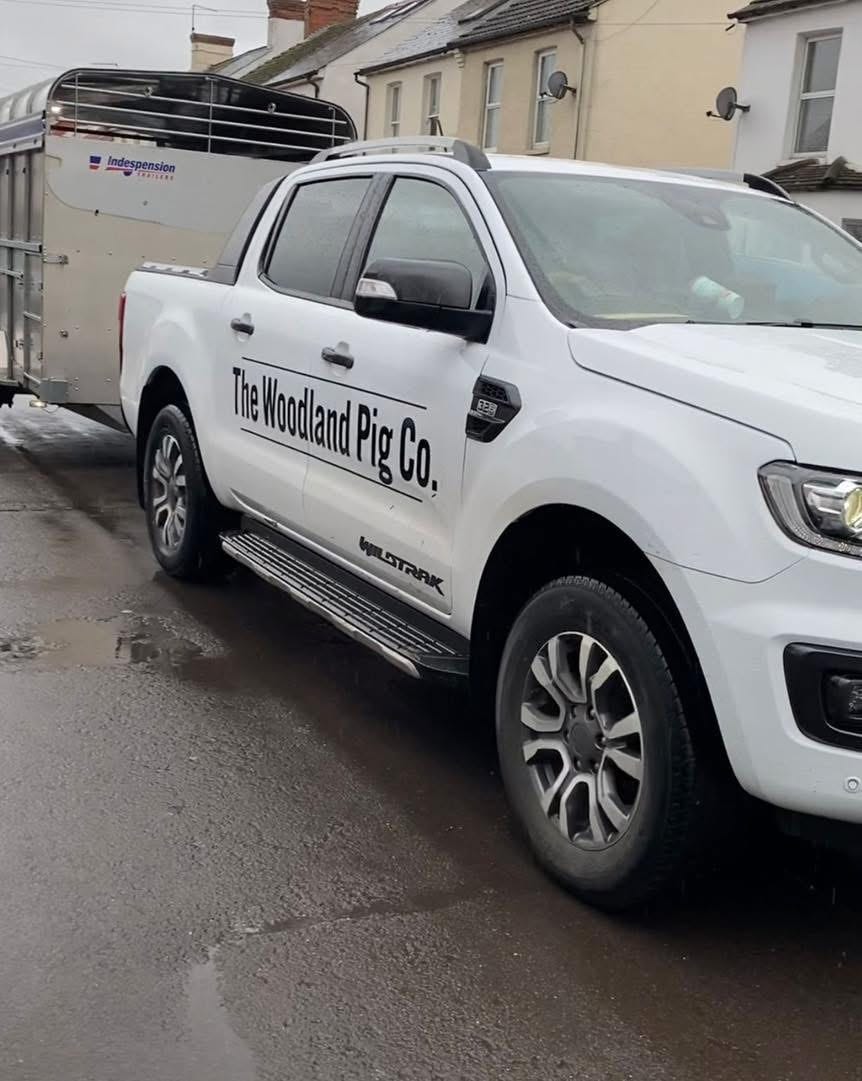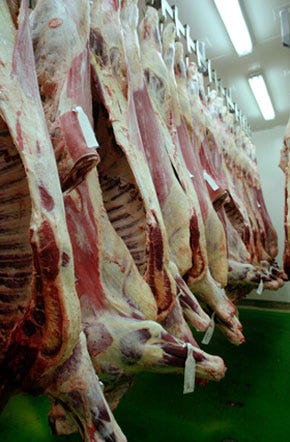Hampshire’s Last Abattoir
What Newman’s Closure Means for Farmers, Welfare, and Food Security
Just before I left to attend the Oxford Real Farming Conference this year, farmers across the South East of England received devastating news: Newman’s Abattoir, the last remaining abattoir in Hampshire, will be closing its doors at the end of the month. For small-scale farmers like me, this isn’t just a logistical inconvenience—it’s a devastating blow to our operations, animal welfare standards, and the future of British farming.
Newman’s, a family-run multi-species slaughterhouse in Farnborough since the 1950s, has been an essential part of the farming community. Currently co-owned by brothers William and Robert Newman, the abattoir serves Hampshire, the Isle of Wight, Surrey, Berkshire, and West Sussex. With its capacity for halal slaughter, multi-species processing, and private kill services, it supplies meat to over 150 local butchers as well as the renowned Smithfield Meat Market. Its closure on January 30th will send shockwaves through the farming community—not just in Hampshire, but far beyond.
Farmers on the Isle of Wight will feel the impact most acutely. With no slaughter facilities on the island, 80% of the island’s livestock has been processed at Newman’s. Now, these farmers face the daunting prospect of transporting their animals further afield, adding stress to their livestock, hours to their days, and costs to their already tight margins. For many, this could be the tipping point that forces them out of farming altogether.
For our farm, Newman’s was the cornerstone of our operation. It’s where we processed our animals, and being just 10 miles away, it allowed us to minimise stress and maintain high welfare standards. Our typical routine involved loading the pigs at 9 am and delivering them for their 10 am slot. By 10:20, the pigs would have been stunned and slaughtered—a quick, humane process essential to preventing stress to our animals.
Now, with Newman’s gone, our closest option for private kill pigs is HF Stiles in Wiltshire, over an hour away. The only other multispecies slaughterhouse in our region is Down Land Traditional Meats in Henfield, West Sussex. However, this much smaller facility is already running at full capacity and unlikely to absorb additional demand. For us, this means waking our pigs at 5 am to load them—or worse, leaving them in a trailer overnight. The longer transport time and potential waiting periods at the abattoir will cause unnecessary stress to our animals—something we’ve always worked so hard to avoid with our commitment to high-welfare farming.
The financial strain is equally significant. Newman’s delivered our carcasses to our butcher for a small fee. Stiles, on the other hand, charges a minimum of £50 for delivery— which has a huge impact compared to the minimal cost we previously paid. Add to that the fuel costs, more time off the farm, potential paid labour to cover our absence, and wear and tear on our vehicle and trailer, and you begin to see how the costs add up. Many of our peers in the area will face the same challenges.
The Bigger Picture: A Crisis in UK Abattoirs
This isn’t just our story—it’s the reality for countless small-scale farmers across the UK. In 1900, there were 30,000 Food Standards Agency (FSA)-registered abattoirs in the UK. By 2003, that number had plummeted to 320. Today, just 122 remain—and not all of them accept multi-species slaughter or provide private kill services. In regions like Northumberland, which relies heavily on livestock farming, there hasn’t been a local abattoir for years, forcing animals to endure hours of travel to slaughter.
At the ORFC, Amy Quirk warned that "if the current rate of closures continues, there will be no abattoirs left in the UK within nine years." The implications for food security are enormous. Without local slaughterhouses, we risk losing small-scale farmers, rare breeds, and high-welfare British meat. Supermarkets will increasingly rely on cheap imports, flooding shelves with substandard products like hormone-fed beef from Brazil and chlorine-washed chicken from the USA.
Animal welfare also suffers. Longer journeys to slaughterhouses create unnecessary stress, undermining the high-welfare standards that small farms work so hard to maintain.
“We are a first-generation family farming business which relies on selling our lamb directly to the public. Some say that we were spoilt to have our local abattoir on our doorstep. Perhaps we were, but regardless this was a vital resource supporting generations of small family farming businesses within the south of England. The loss of this vital link in our chain has called into question the viability of what we do. The added cost may mean that the business we have worked so hard to build is no longer viable.”
— The Hampshire Shepherd, Rare Breed Sheep, Little Church Farm, Mattingley, Hampshire
Exploring Solutions: On-Farm Slaughter and Mobile Units
It is a proven fact that on-farm slaughter is the most humane method. However, current UK regulations only allow it for personal consumption, with the exception of deer. In 2021, the EU adopted a policy allowing livestock shot on-farm to enter the food chain if processed within an hour. This approach could revolutionise animal welfare in the UK, but we lack the political framework to implement it. Share buying of livestock has also become popular amongst consumers who wish to rear their own meat but not to put a whole carcass in their freezer. A collective group buys “shares” of the livestock and splits the meat once processed which counts as personal consumption. It has been suggested that this way of buying could be scaled up to allow more livestock to be slaughtered on farm humanely and then pass into personal consumption of a larger pool of consumers but as discussed at ORFC is cutting it very close to the word of the law and could have legal implications.
Mobile slaughter units (MSUs) have been proposed as a way to bridge the gap, but they come with challenges. Fir Farm in the Cotswolds trialled an MSU, but regulatory restrictions mean it’s not truly mobile—each site it visits would require separate FSA registration and planning approval.
A pilot study in Northumberland is exploring the potential of MSUs, with two units costing around £200,000. While promising, these units are limited to single-species slaughter, which restricts their usability. However, I believe co-operatives of small-scale farmers could make MSUs viable. By pooling resources, farmers could operate facilities that offer private kill services and even value-added processing like bacon curing and charcuterie production.
“The closure of Newman’s is a huge worry. This facility was a lifeline for so many small businesses and smallholders, not only providing slaughter services but also delivering carcasses directly to my door. They even referred new clients to me, helping to sustain my business. With increased travel times and higher costs now inevitable, I fear many smaller farms and producers will simply stop sending livestock altogether. This closure threatens the survival of both farms and the businesses that rely on them.”
— Emily McInnes, McInnes Meat, Private Kill Butcher, Alresford, Hampshire
The Fight to Protect British Farming
Slaughter is an uncomfortable topic, even for farmers. It’s the hardest part of the job, but it’s also an integral part of the food system. The more abattoirs we lose, the more disconnected we become from where our food comes from. British farmers uphold some of the highest welfare standards in the world. By supporting them, we’re not just backing local businesses—we’re standing up for animal welfare, food security, and the environment.
Farmers are already fighting battles on multiple fronts, from rising costs to changes in inheritance tax relief. Newman’s closure feels like yet another blow in a system that’s already broken. But it’s not too late to turn the tide. By choosing local meat and advocating for policies that support small abattoirs, we can ensure a future where small-scale, high-welfare farming thrives.
Support This Work
If you’ve found this post insightful or want to help amplify the voice of small-scale farmers, consider becoming a paid subscriber. Your support helps me continue to share stories like this, raise awareness about issues affecting farming, and explore solutions for the challenges we face. Paid subscribers will get access to exclusive content, including interviews with experts, deeper dives into farming challenges, and creative solutions like co-operatives and mobile slaughter units. Let’s work together to advocate for a food system that values farmers, animals, and the land.








This was really informative, Helen -- thanks! I hope UK laws improve in this manner and you soon have access to a local abattoir. Small farmers are angels on earth.
When I started we had 5 within 7 miles of us. Now Henfield have to book three months in advance. So this is first year since 1967 that I have no pigs. No more Gloucester Old Spots .